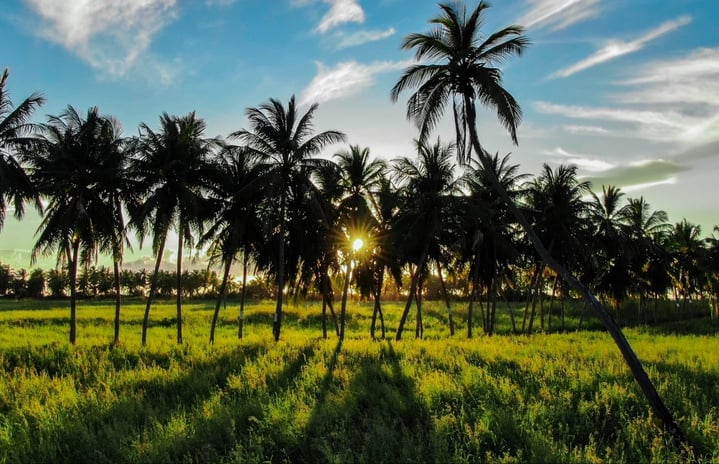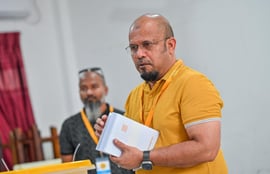Thoodoo Island Council, this week, began distributing supplies among farmers seeking to utilise their fields for cultivating grains such as corn and grain sorghum.
“The initiative was taken to ensure food security for all of Thoddoo”, said Vice President of the Island’s Council, Hassan Abdulla. “We must make an effort today to ensure that our community continues to be fed and protected tomorrow”.
The decision by Thoddoo farmers to pursue the growth of grain and other produce comes at a time when the world's economy is struggling and there have been setbacks in the transportation of various goods owing to the global pandemic COVID-19. One of the greatest concern amid this health crisis for Maldives, in particular, arises due to the country's heavy dependence on imports for food supply.
Speaking to The Edition, Hassan confirmed that the island council has started to aid all interested in partaking with the necessary seeds, compost and other required support.
Hassan explained that while a number of farmers were opting to re-purpose watermelon fields, others had begun pinpointing locations where soil could be treated for harvesting crops.
The island of Thoddoo is a key agricultural production centre for capital Male' and other centrally located islands. Although the island produces a number of fruits and vegetables such as Papaya, Bitter Gourd, Radish, Chinese Lettuce, it is best known for its production of watermelons, a commodity high in demand during the month of Ramadan.
This year, according to the councilman, the economic outcome is set to be different.
“Our farmers have been affected by the reduced ferries to Male’, especially with the market being closed”, stated Hassan. “Many cafes and restaurants that purchase Thoddoo-grown products have ceased operations as well”.
With sales and demand projected to be significantly lowered compared to the boom of previous Ramadan periods, profits are set to suffer accordingly unless the situation improves soon.
If the project proves successful, Hassan offers, “The benefits will be reaped by the entire Maldives”.
Responding to the question about the progress of these projects, a farmer from Thoddoo answered, “Right now, we are focusing on sowing, growing and hoping for the best”.
Famers on the island estimate that if all goes well, the island will have over 8,000 crops bearing produce within two months. Although it offers a higher yield, corn production is easily affected by changes in weather and water supply, whereas experts dub sorghum a more resilient option that offers a reliable, nutritious yield even in harsh climates.
“Both options were deemed sustainable and feasible”, stated a farmer from Thoddoo.
Despite the island being synonymous with watermelon production across the archipelago, this is not the farming community’s first hand at growing types of grain.
“Some of our younger islanders may not remember, but a long time ago we did grow corn. Years have passed but there are still those among us that possess this knowledge”, Hassan assured. “Recently, our production has been largely profit driven. We were focusing on growing crops that produce a large yield in a short amount of time. For instance we used to grow sweet potato as well, but stopped because of the duration factor”.
Other atolls and islands, such as Addu Atoll, Kurinbee in Haa Dhaalu Atoll and Maamigili in Alif Dhaalu Atoll, are also taking steps to aid agricultural work through leasing land for farming purposes and forgiving rental payments for such plots to ease financial burdens.
It should be noted that certain parts of Addu, such as Meedhoo, have a history of growing grains like corn in addition to vegetables like taro, cucumber, brinjal and more. Nevertheless, in the wake of the pandemic, the city council has pledged to expand their presently minimal production to attain more self sufficiency.
“Happy to know that more and more Maldivians are choosing to invest in Agriculture. There are large islands that can be used as a land resource, especially in atolls such as Laamu”, noted Hassan.
“We encourage other councils to do the same with their land. For their people, their communities and for the benefit of our country at a large”.
As with many other countries, the disruption to transport caused by the global COVID-19 pandemic has already begun to have severe effects across Maldives. It is estimated that Maldives' heavily tourism reliant economy will face severe repercussions as a result of the pandemic and experience a shortfall of approximately USD 450 million (MVR 6.9 billion) in foreign currency.
Last Thursday, in a move to further encourage agricultural production in the wake of the pandemic, State Trading Organization (STO)’s Managing Director Hussain Amru announced the opening of an AgriCenter in May. The establishment will purchase all locally grown produce at better rates than market price and then wholesale the products across all regions, whilst retailing it at STO Supermart.
Since coming into power, the present administration has made some movement to facilitate growth in agricultural sector, having abolished taxes on agricultural supplies as well as leased 77 islands for fishing and agricultural purposes, per electoral pledges, in December 2018.




